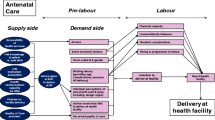Abstract
Maternal and newborn death is common in Sierra Leone; significant reductions in both maternal and newborn mortality require universal access to a skilled attendant during labor and delivery. When too few women use health facilities MDGs 4 and 5 targets will not be met. Our objectives were to identify why women use services provided by TBAs as compared to health facilities; and to suggest strategies to improve utilization of health facilities for maternity and newborn care services. Qualitative data from focus group discussions in communities adjacent to health facilities collected during the 2008 Emergency Obstetric and Newborn Care Needs Assessment were analyzed for themes relating to decision-making on the utilization of TBAs or health facilities. The prohibitive cost of services, and the geographic inaccessibility of health facilities discouraged women from using them while trust in the vast experience of TBAs as well as their compassionate care drew patients to them. Poor facility infrastructure, often absent staff, and the perception that facilities were poorly stocked and could not provide continuum of care services were barriers to facility utilization for maternity and newborn care. Improvements in infrastructure and the 24-hour provision of free, quality, comprehensive, and respectful care will minimize TBA preference in Sierra Leone.
Similar content being viewed by others
References
UNICEF. (2007). Statistical Tables, The State of the World’s Children: United Nations Children’s Fund, New York, NY 10017, USA December 2007.
UN. (2000). Available from: http://www.un.org/millenniumgoals/.Millennium Development 6 October 2011 Goals.
GoSL, Sierra Leone Demographic and Health Survey. (2008). S.S.L.S.a.I. Macro., Editor. 2009.
Oyerinde, K., et al. (2011). The status of maternal and newborn care services in Sierra Leone 8 years after ceasefire. International Journal of Gynecology and Obstetrics, 114(2), 168–173.
Bergström, S., & Goodburn, E. (2001). The role of traditional birth attendants in the reduction of maternal mortality studies in Health Services Organisation and Policy, 17.
Goodburn, E. A., et al. (2000). Training traditional birth attendants in clean delivery does not prevent postpartum infection. Health Policy and Planning, 15(4), 394–399.
Sibley, L. M., Sipe, T. A., & Koblinsky, M. (2004). Does traditional birth attendant training increase use of antenatal care? A review of the evidence. The Journal of Midwifery and Women’s Health, 49(4), 298–305.
WHO (2005). The World Health Report: make every mother and child count. Geneva, Switzerland: World Health Organization.
GoSL, Report of the Nationwide Needs Assessment for Emergency Obstetric and Newborn Care Services in Sierra Leone. (2008). Ministry of Health and Sanitation, Government of Sierra Leone.
Fenton, A. (2006). Weft QDA User’s Manual. 16 September 2011 Available from: http://www.pressure.to/qda/.
Koblinsky, M., et al. (2006). Going to scale with professional skilled care. The Lancet, 368(9544), 1377–1386.
Thompson, F. (2010). Now it’s free, how to pay for it? Sierra Leone’s dilemma. Bulletin of the World Health Organization, 88, 883–884.
Amnesty-International (2011). At a crossroads: Sierra Leone’s free health care policy, L.U. Amnesty International, Editor. London, UK: Amnesty International Ltd.
Ezechi, O. B., Fasubaa, F. O., & Dare, O. C. (2000). Socioeconomic barriers to safe motherhood among booked patients in rural Nigerian communities. Journal of Obstetrics and Gynaecology, 20(1), 32–34.
Storeng, K. T., et al. (2008). Paying the price: The cost and consequences of emergency obstetric care in Burkina Faso. Social Science and Medicine, 66(3), 545–557.
Bowser, D., Hill K., (2010). Exploring evidence for disrespect and abuse in facility based childbirth. USAID-TRACTION Project, Harvard School of Public Health, University Research Co., LLC.
Olusanya, B. O., Alakija, O. P., & Inem, V. A. (2010). Non-uptake of facility-based maternity services in an inner-city community in lagos, Nigeria: An observational study. Journal of Biosocial Science, 42(03), 341–358.
Fujita, N., et al. (2011). Humanised care and a change in practice in a hospital in Benin. Midwifery.
Avortri, G. S., Beke, A., & Abekah-Nkrumah, G. (2011). Predictors of satisfaction with child birth services in public hospitals in Ghana. International Journal of Health Care Quality Assurance, 24(3), 223–237.
McClimans, L. M., Dunn, M., & Slowther, A.-M. (2011). Health policy, patient-centred care and clinical ethics. Journal of Evaluation in Clinical Practice, 17(5), 913–919.
Acknowledgments
The study was funded in part by Irish Aid in contribution to the Sierra Leone Joint UN Programme. The funders, UN agencies and the Ministry of Health and Sanitation bear no responsibility for the findings of the study and the views expressed are solely those of the authors. Our thanks go to our UN, NGO and MoHS colleagues who provided a variety of services to make the study possible.
Author information
Authors and Affiliations
Corresponding author
Rights and permissions
About this article
Cite this article
Oyerinde, K., Harding, Y., Amara, P. et al. A Qualitative Evaluation of the Choice of Traditional Birth Attendants for Maternity Care in 2008 Sierra Leone: Implications for Universal Skilled Attendance at Delivery. Matern Child Health J 17, 862–868 (2013). https://doi.org/10.1007/s10995-012-1061-4
Published:
Issue Date:
DOI: https://doi.org/10.1007/s10995-012-1061-4



